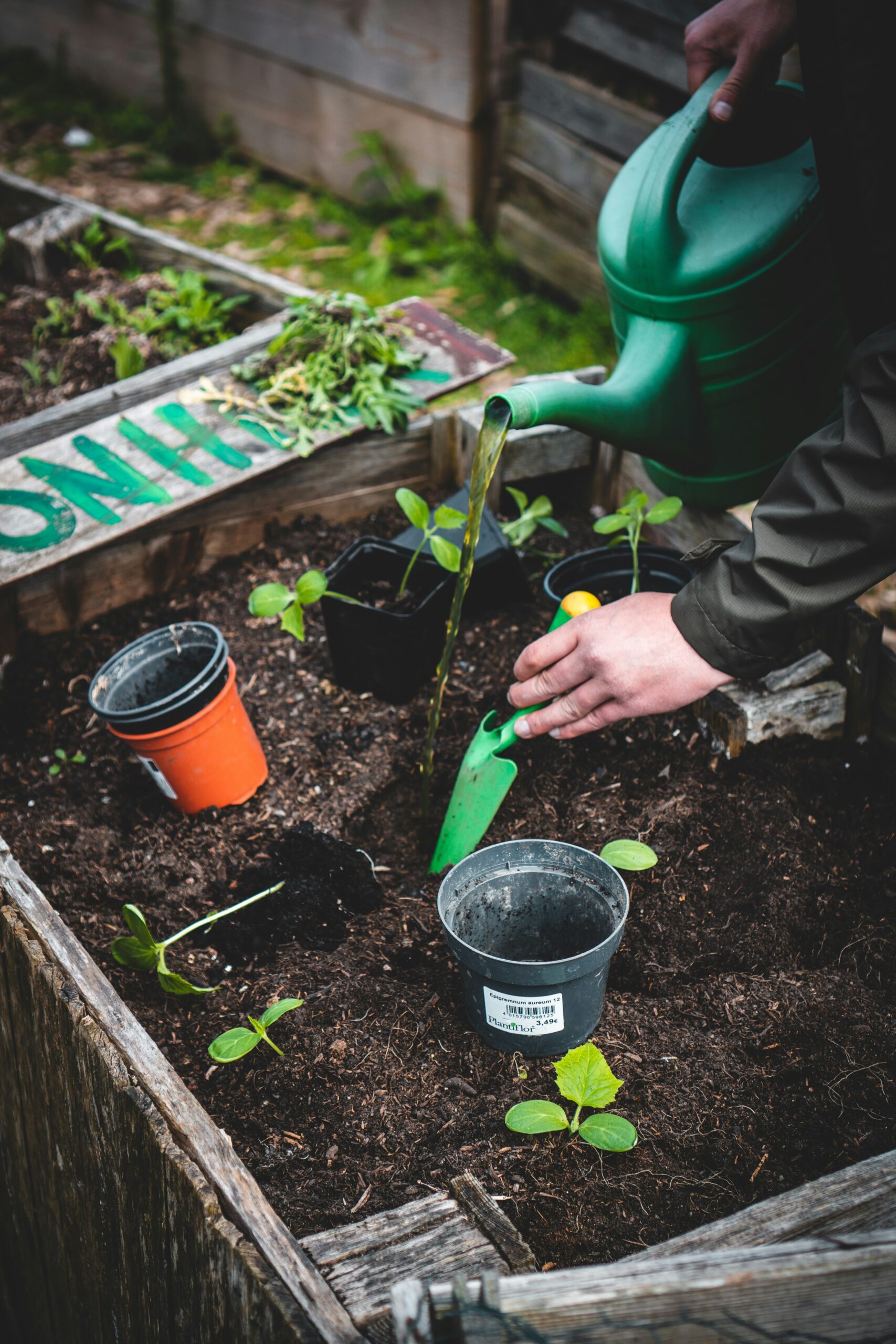Are you looking for a fun and rewarding way to improve your health? Look no further than gardening! In addition to being a great way to spend your time outdoors, gardening offers a multitude of health benefits. From reducing stress and anxiety to improving physical fitness and mental well-being, tending to your plants and flowers can have a profound positive impact on your overall health. So put on your gardening gloves and discover the many ways gardening can benefit both your body and mind.

Mental Health Benefits
Reduced stress and anxiety
Gardening has been proven to have a significant impact on reducing stress and anxiety levels. When you engage in gardening activities, you are immersed in a peaceful and tranquil environment, away from the chaos of everyday life. The act of planting, tending to plants, and being surrounded by nature promotes a sense of calmness and serenity. The rhythmic and repetitive movements involved in gardening can also help to relax your mind and alleviate stress.
Improved mood and self-esteem
Gardening has a positive effect on your overall mood and well-being. As you watch your plants thrive under your care and witness the beauty of nature unfolding before your eyes, it naturally boosts your mood and uplifts your spirits. The sense of accomplishment and pride that comes with successfully growing and nurturing plants can also contribute to a boost in self-esteem and self-confidence. Gardening allows you to connect with the natural world and find joy in the simple pleasures it offers.
Increased focus and concentration
Engaging in gardening activities requires focus and concentration, which can improve your cognitive abilities. Whether you are planting seeds, pruning, or weeding, these tasks demand your attention and help sharpen your mental acuity. The act of tending to your garden and observing the growth and changes in your plants also encourages mindfulness, allowing you to be fully present in the moment. This increased focus and concentration can have carry-over effects into other areas of your life, enhancing your overall productivity and mental clarity.
Physical Health Benefits
Increased physical activity
Gardening is a fantastic way to incorporate physical activity into your daily routine. Digging, planting, watering, and other gardening tasks require physical effort and movement, which can contribute to increased strength, endurance, and flexibility. By spending time in your garden, you are engaging in a form of exercise that is enjoyable and fulfilling, making it easier to maintain an active lifestyle.
Improved cardiovascular health
Regularly participating in gardening activities can provide cardiovascular benefits. Activities such as digging, raking, and pushing a wheelbarrow elevate your heart rate, promoting better circulation and a healthier cardiovascular system. These physical exertions contribute to strengthening your heart and lungs, reducing the risk of cardiovascular diseases such as heart attacks and strokes.
Enhanced flexibility and strength
Gardening involves a wide range of movements and positions, such as bending, squatting, and stretching. These movements promote flexibility and help to improve your range of motion. Additionally, activities such as lifting pots or bags of soil can increase your muscle strength and tone. By engaging in gardening, you are effectively working your muscles and joints, keeping them active and mobile.
Nutritional Benefits
Access to fresh, homegrown produce
One of the most significant nutritional benefits of gardening is the access to fresh, homegrown produce. Growing your fruits, vegetables, and herbs allows you to have a readily available supply of nutritious food right in your backyard. The satisfaction of harvesting your own produce and knowing exactly where it came from adds to the enjoyment and appreciation of the food you consume.
Increased consumption of fruits and vegetables
When you have a garden, you are more likely to incorporate a variety of fruits and vegetables into your diet. The abundance of fresh, homegrown produce serves as a reminder to incorporate these nutrient-rich foods into your meals. Having your garden also encourages experimentation with different types of fruits and vegetables that you may not have tried before, expanding your palate and ensuring a more diverse nutrient intake.
Improved diet quality
By cultivating your fruits and vegetables, you have control over the cultivation methods and the use of pesticides or fertilizers. This control allows you to prioritize organic practices and opt for healthier alternatives, leading to an improved overall diet quality. The knowledge that your produce is free from harmful chemicals and pesticides promotes peace of mind and contributes to a more wholesome and nourishing diet.
Immune System Boost
Exposure to beneficial microorganisms
Gardening exposes you to a diverse array of microorganisms present in the soil and environment. While some might perceive this as potentially harmful, these microorganisms can actually have a positive impact on your immune system. Exposure to beneficial bacteria, fungi, and viruses found in the garden can help strengthen and train your immune system, reducing the risk of allergies and asthma.
Strengthening of the immune system
The act of gardening stimulates your immune system, leading to its strengthening and improved functionality. The physical activity involved in gardening, coupled with exposure to sunlight and fresh air, helps to support a robust immune response. A stronger immune system means a reduced susceptibility to common illnesses and infections.
Reduced risk of allergies and asthma
Research suggests that early exposure to environmental factors, such as those encountered in gardening, may reduce the risk of developing allergies and asthma later in life. By spending time outdoors and being in contact with nature, you are exposing yourself to a wide range of allergens and pathogens. This exposure can help to build tolerance and prevent the development of allergies and asthma in susceptible individuals.

Stress Reduction
Connection to nature and green spaces
Being in nature and surrounded by green spaces has a profound impact on reducing stress levels. Gardening provides a direct connection to nature, allowing you to immerse yourself in its beauty and tranquility. The sights, sounds, and smells of your garden create a serene and peaceful environment that can help to calm your mind and alleviate stress. Spending time outdoors and breathing in fresh air can have a rejuvenating effect on your overall well-being.
Sense of accomplishment and purpose
Gardening provides a sense of accomplishment and purpose that can significantly reduce stress. Watching your garden thrive and grow under your care promotes a feeling of achievement and satisfaction. The act of nurturing plants and witnessing the fruits of your labor instills a sense of purpose and fulfillment. This sense of accomplishment serves as a powerful antidote to stress and contributes to overall mental well-being.
Opportunity for mindfulness and relaxation
Engaging in gardening activities offers the opportunity for mindfulness and relaxation. As you tend to your plants, you can focus solely on the present moment, observing the intricate details of each plant and immersing yourself in the task at hand. This mindfulness practice helps to quiet the mind and promotes a state of relaxation and calm. Gardening can serve as a therapeutic outlet for stress relief, allowing you to de-stress and recharge in a peaceful environment.
Better Sleep
Increased exposure to sunlight and vitamin D
Spending time in your garden exposes you to natural sunlight, which is essential for regulating your body’s internal clock and sleep-wake cycle. Exposure to sunlight helps to stimulate the production of vitamin D, a nutrient that plays a crucial role in maintaining healthy sleep patterns. By spending time in your garden, you are naturally increasing your exposure to sunlight and promoting better sleep quality.
Regulation of circadian rhythms
Gardening can help regulate your circadian rhythms, the internal process that regulates your sleep and wake cycles. The exposure to natural light and the synchronization of your body’s internal clock with daylight can help establish a consistent sleep schedule. By engaging in gardening activities and spending time outdoors, you are supporting the natural regulation of your sleep-wake cycle, leading to better sleep.
Enhanced relaxation and stress relief
The act of gardening promotes relaxation and stress relief, which can indirectly contribute to better sleep. When you engage in gardening activities, you momentarily escape from the demands and stressors of daily life. The calming and therapeutic nature of gardening helps to relax your mind and body, making it easier to fall asleep and achieve a more restful sleep. Gardening can serve as a healthy and enjoyable pre-bedtime routine to unwind and prepare your body for sleep.

Weight Management
Calorie burning through gardening tasks
Gardening activities can be physically demanding and provide an opportunity for calorie burning. Tasks such as digging, weeding, and watering require effort and energy expenditure, contributing to the overall calories burned during your gardening session. Incorporating gardening into your routine can supplement other forms of physical activity and assist in weight management or weight loss goals.
Healthy snacking on fresh produce
Having a garden provides easy access to fresh produce, which can be a healthy alternative for snacking. Instead of reaching for processed and unhealthy snacks, you can indulge in the vibrant flavors of your homegrown fruits and vegetables. Snacking on fresh produce promotes satiety, provides essential nutrients, and helps to manage portion sizes, thereby contributing to weight management.
Reduced risk of obesity
Regular engagement in gardening activities can help reduce the risk of obesity. The physical exertion involved in gardening tasks serves as a form of exercise, burning calories and contributing to weight control. By prioritizing gardening as a part of your active lifestyle, you are increasing your daily energy expenditure and decreasing the likelihood of weight gain and obesity.
Enhanced Brain Health
Improved cognitive function
Engaging in gardening has been shown to improve cognitive function and mental sharpness. The combination of physical activity, sensory stimulation, and cognitive engagement involved in gardening tasks can enhance brain health. Regularly challenging your mind through gardening activities can help improve memory, attention, and problem-solving skills, promoting overall cognitive function.
Reduced risk of dementia and Alzheimer’s
Research suggests that gardening may reduce the risk of developing dementia and Alzheimer’s disease. The combination of physical activity, exposure to nature, and the mental stimulation provided by gardening can have a protective effect on the brain. The multi-sensory experience of gardening engages various regions of the brain, promoting neural connections and preventing cognitive decline.
Increased mental stimulation
Gardening provides ongoing mental stimulation, keeping your mind active and engaged. The planning and organization required for garden design, the learning process of understanding plant needs, and the problem-solving involved in troubleshooting garden issues all contribute to mental stimulation. By continuously challenging your mind through gardening, you are promoting mental agility and stimulating brain activity.
Community Engagement
Opportunity for social interactions
Gardening provides an excellent opportunity for social interactions and connections with others. Whether it’s joining a community garden, attending gardening workshops, or simply exchanging tips and advice with fellow gardeners, engaging in gardening activities can foster a sense of community. Sharing the joys and challenges of gardening with others enhances the overall gardening experience and allows for meaningful social connections.
Connection to neighbors and community
Having a garden can strengthen the bond with your neighbors and community. Sharing the abundance of your harvest with neighbors, participating in neighborhood garden tours, or organizing gardening events can bring people together and create a sense of belonging. Gardening serves as a common ground for building relationships and contributing to the well-being of your local community.
Shared knowledge and resources
Gardening provides an opportunity for the sharing of knowledge and resources among fellow gardeners. Whether it’s discussing gardening techniques, exchanging tips and tricks, or sharing surplus seeds or plants, the gardening community is known for its generosity and willingness to support one another. This shared knowledge and collaboration contribute to the growth and success of individual gardeners and the gardening community as a whole.
Environmental Impact
Contribution to biodiversity and wildlife
Gardening plays a significant role in contributing to biodiversity and supporting wildlife. By cultivating a diverse range of plants, you provide habitats and food sources for various species, including birds, bees, butterflies, and other pollinators. Gardening with native plants or creating wildlife-friendly areas in your garden can help restore and conserve biodiversity, promoting a thriving ecosystem.
Reduced carbon footprint
Gardening has a positive environmental impact by reducing your carbon footprint. Planting trees and vegetation helps to absorb carbon dioxide from the atmosphere, mitigating the effects of climate change. Additionally, growing your own food reduces the need for transportation, packaging, and processing associated with store-bought produce, thus reducing greenhouse gas emissions.
Conservation of water and soil
Implementing water-wise gardening practices, such as mulching and using efficient irrigation methods, helps conserve water. Gardening also plays a crucial role in soil conservation by preventing erosion and promoting healthy soil structure. By building healthy soil through composting and organic gardening practices, you contribute to the conservation and preservation of this vital natural resource.
In conclusion, gardening offers numerous health benefits that encompass both physical and mental well-being. From reducing stress and anxiety to improving mood and self-esteem, gardening can positively impact your mental health. Engaging in gardening activities promotes increased physical activity, improves cardiovascular health, and enhances flexibility and strength. Additionally, gardening provides nutritional benefits through access to fresh, homegrown produce and an increased consumption of fruits and vegetables. Gardening also strengthens the immune system, reduces allergies and asthma risk, and aids in stress reduction. It promotes better sleep, supports weight management, enhances brain health, and fosters community engagement. Furthermore, gardening contributes to the conservation of the environment by supporting biodiversity, reducing carbon footprint, and conserving water and soil. Embracing gardening as a lifelong hobby not only nourishes plants but also nurtures your overall well-being and connection to the world around you.





